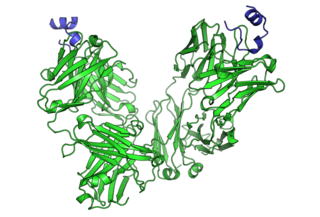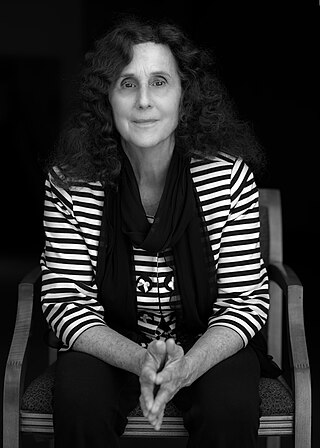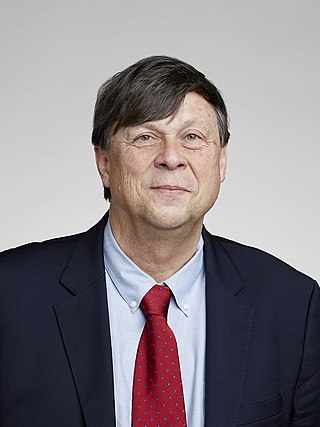Related Research Articles
In biology, chimeric antigen receptors (CARs)—also known as chimeric immunoreceptors, chimeric T cell receptors or artificial T cell receptors—are receptor proteins that have been engineered to give T cells the new ability to target a specific antigen. The receptors are chimeric in that they combine both antigen-binding and T cell activating functions into a single receptor.

Cancer immunotherapy (immuno-oncotherapy) is the stimulation of the immune system to treat cancer, improving the immune system's natural ability to fight the disease. It is an application of the fundamental research of cancer immunology (immuno-oncology) and a growing subspecialty of oncology.
Tak Wah Mak, is a Canadian medical researcher, geneticist, oncologist, and biochemist. He first became widely known for his discovery of the T-cell receptor in 1983 and pioneering work in the genetics of immunology. In 1995, Mak published a landmark paper on the discovery of the function of the immune checkpoint protein CTLA-4, thus opening the path for immunotherapy/checkpoint inhibitors as a means of cancer treatment. Mak is also the founder of Agios Pharmaceuticals, whose lead compound, IDHIFA®, was approved by the FDA for acute myeloid leukemia in August 2017, becoming the first drug specifically targeting cancer metabolism to be used for cancer treatment. He has worked in a variety of areas including biochemistry, immunology, and cancer genetics.

Pamela Jane Bjorkman NAS, AAAS is an American biochemist and molecular biologist. She is the David Baltimore Professor of Biology and Biological Engineering at the California Institute of Technology (Caltech). Her research centers on the study of the three-dimensional structures of proteins related to Class I MHC, or Major Histocompatibility Complex, proteins of the immune system, and proteins involved in the immune responses to viruses. Bjorkman's goal is to improve current therapeutic applications. Bjorkman is most well known as a pioneer in the field of structural biology.

Steven A. Rosenberg is an American cancer researcher and surgeon, chief of Surgery at the National Cancer Institute in Bethesda, Maryland and a Professor of Surgery at the Uniformed Services University of Health Sciences and the George Washington University School of Medicine and Health Sciences. He pioneered the development of immunotherapy that has resulted in the first effective immunotherapies and the development of gene therapy. He is the first researcher to successfully insert foreign genes into humans.

Ralph Marvin Steinman was a Canadian physician and medical researcher at Rockefeller University, who in 1973 discovered and named dendritic cells while working as a postdoctoral fellow in the laboratory of Zanvil A. Cohn, also at Rockefeller University. Steinman was one of the recipients of the 2011 Nobel Prize in Physiology or Medicine.
Christopher Edward Rudd, is a Canadian-born immunologist-biochemist. He is currently Professor of Medicine at the Universite de Montreal and Director, Immunology-Oncology at the Centre de Recherche Hôpital Maisonneuve-Rosemont (CR-HMR).
Adoptive cell transfer (ACT) is the transfer of cells into a patient. The cells may have originated from the patient or from another individual. The cells are most commonly derived from the immune system with the goal of improving immune functionality and characteristics. In autologous cancer immunotherapy, T cells are extracted from the patient, genetically modified and cultured in vitro and returned to the same patient. Comparatively, allogeneic therapies involve cells isolated and expanded from a donor separate from the patient receiving the cells.

James Patrick Allison is an American immunologist and Nobel laureate who holds the position of professor and chair of immunology and executive director of immunotherapy platform at the MD Anderson Cancer Center in Houston, Texas. Allison is Regental Professor and Founding-Director of James P. Allison Institute at the MD Anderson Cancer Center.
The Massry Prize was established in 1996, and is administered by the Meira and Shaul G. Massry Foundation. The Prize, of $40,000 and the Massry Lectureship, is bestowed upon scientists who have made substantial recent contributions in the biomedical sciences. Shaul G. Massry, M.D., who established the Massry Foundation, is Professor Emeritus of Medicine and Physiology and Biophysics at the Keck School of Medicine, University of Southern California. He served as Chief of its Division of Nephrology from 1974 to 2000. In 2009 the KECK School of Medicine was asked to administer the Prize, and has done so since that time. Out of 25 prizes bestowed until 2021, fourteen were awarded to future Nobel Prize winners. No Massry Prize was awarded in 2020, 2022 and 2023.
Kite Pharma, Inc. is an American biotechnology company that develops cancer immunotherapy products with a primary focus on genetically engineered autologous CAR T cell therapy - a cell-based therapy which relies on chimeric antigen receptors and T cells. Founded in 2009, and based in Santa Monica, California, it was acquired by Gilead Sciences in 2017.

Mark Morris Davis is an American immunologist. He is the director of and Avery Family Professor of Immunology at the Institute for Immunity, Transplantation and Infection at Stanford University.

Carl H. June is an American immunologist and oncologist. He is currently the Richard W. Vague Professor in Immunotherapy in the Department of Pathology and Laboratory Medicine at the Perelman School of Medicine of the University of Pennsylvania. He is most well known for his research on T cell therapies for the treatment of several forms of cancers. In 2020 he was elected to the American Philosophical Society.
Gideon Gross is an Israeli immunologist, inventor and farmer. Together with Zelig Eshhar at the Weizmann Institute of Science, they created the first chimeric antigen receptors (CARs). He was dean of the Faculty of Sciences & Technology of Tel-Hai Academic College from 2010 to 2014. He is also a specialist mango farmer.
Misty Rayna Jenkins is an Australian scientist known for her research into lymphocytes and cancer treatment.
Marcela V. Maus is a professor of medicine at Harvard Medical School and director of the Cellular Immunotherapy Program at Massachusetts General Hospital. She works on immunotherapy for the treatment of cancer, using genetically engineered T cells to target malignancies (cancer).

Michel Sadelain is a genetic engineer and cell therapist at Memorial Sloan Kettering Cancer Center, New York, New York, where he holds the Steve and Barbara Friedman Chair. He is the founding director of the Center for Cell Engineering and the head of the Gene Transfer and Gene Expression Laboratory. He is a member of the department of medicine at Memorial Hospital and of the immunology program at the Sloan Kettering Institute. He is best known for his major contributions to T cell engineering and chimeric antigen receptor (CAR) therapy, an immunotherapy based on the genetic engineering of a patient's own T cells to treat cancer. Dr. Sadelain is an elected member of the National Academy of Medicine of France and the American Academy of Arts & Sciences.

The Doctor Juan Abarca International Award in Medical Sciences, known as the Abarca Prize, is an award that recognises research and innovation through a biomedical finding of global significance.
Philip Greenberg is a professor of medicine, oncology, and immunology at the University of Washington and head of program in immunology at the Fred Hutchinson Cancer Research Center. His research is centered around T cell biology and therapeutic cell therapies. He is a co-founder of Juno Therapeutics.

The Breakthrough: Immunotherapy and the Race to Cure Cancer is a non-fiction book written by American journalist and author Charles Graeber. The book was written for the lay reader and includes sections on immunology written for a general audience. It was published by Twelve just before James P. Allison and Tasuku Honjo won the 2018 Nobel Prize in Physiology or Medicine for their work on cancer immunology.
References
- ↑ The Story Behind an Israeli Immunologist's Cancer-fighting Breakthrough, Haaretz
- 1 2 Regalado, Antonio (June 18, 2015). "Biotech's Coming Cancer Cure". Technology Review.
- ↑ "Zelig Eshhar Ph.D." Businessweek. Retrieved 19 September 2014.[ dead link ]
- ↑ Brower, Vicki (April 1, 2015). "The CAR T-Cell Race". The Scientist.
- ↑ "Awards". www.esgct. Retrieved 12 December 2017.
- ↑ "2014 Massry Prize recipients noted for work in immunotherapy". University of Southern California. 19 August 2014. Retrieved 19 September 2014.
- ↑ "Drs. Zelig Eshhar and Carl June Honored with Pioneer Awards". GEN. 11 November 2014. Retrieved 12 December 2017.
- ↑ Gravé-Lazi, Lidar (1 February 2015). "Weizmann Institute professors to be awarded Israel Prizes". The Jerusalem Post | JPost.com. Retrieved 12 December 2017.
- ↑ "William B. Coley Award". Cancer Research Institute. Retrieved 31 August 2020.
- ↑ Dan David Prize 2021
- ↑ Canada Gairdner International Award 2024
- ↑ "The VinFuture 2024 Grand Prize honours 5 scientists for transformational contributions to the advancement of deep learning". Việt Nam News . December 7, 2024.